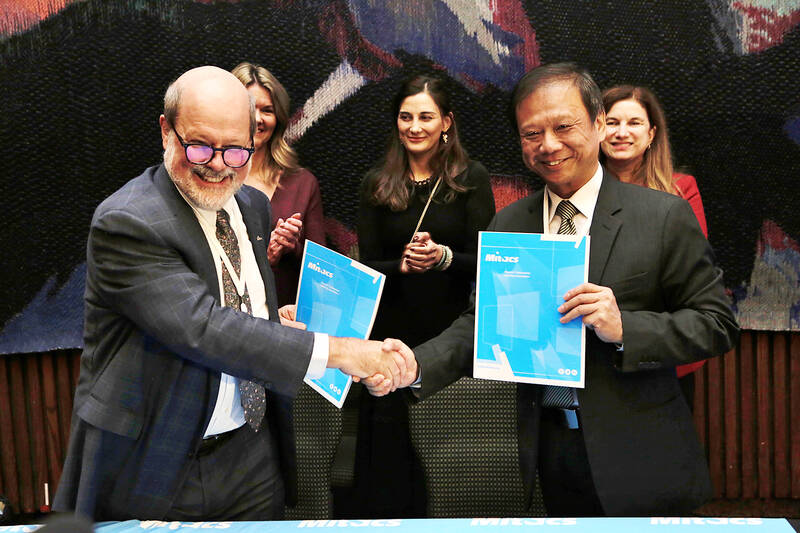Hon Hai Precision Industry Co’s (鴻海精密) research arm has signed a memorandum of understanding (MOU) with a Canadian nonprofit group to develop quantum technologies, the iPhone assembler said yesterday.
Hon Hai Research Institute CEO Lee Wei-bin (李維斌) signed the accord with Mitacs CEO John Hepburn, Hon Hai said in a statement.
Under the agreement, Mitacs is to draw on a vast network of leading research institutions in Canada to provide advice on funding and talent development to Hon Hai’s research arm for the company’s quantum technology development, it said.

Photo courtesy of Hon Hai Precision Industry Co
The study of quantum technologies focuses on atom-scale phenomena and seeks to apply their principles to complex issues that are beyond the capabilities of supercomputers.
Hon Hai, which is diversifying its business from a pure contract manufacturer to the field of software-hardware integration, is working on quantum technologies as it seeks to extend its reach to next-generation semiconductors, it said.
Hon Hai said the cooperation agreement has the full support of the Canadian Trade Office in Taipei.
Hon Hai cited Canadian Minister of International Trade, Export Promotion, Small Business and Economic Development Mary Ng (伍鳳儀) as saying that the agreement demonstrated Canada’s commitment to bolstering its trade and investment relations with partners in the Indo-Pacific region, including Taiwan.
Hon Hai has its own expectations for the agreement.
“Through this new partnership, we hope to connect the institute with Canadian professionals and experts with the goal of jointly investing in cutting-edge technology research, beginning in the field of quantum technologies,” Lee said in the statement.
“Through Mitacs, we hope to fund quantum computation research projects in Canada and hire five to 10 research interns in the first year,” Lee said.
Hon Hai said that the partnership with Mitacs is the first step in its efforts to develop research-and-development capabilities in Canada, as it intends to set up research and design facilities there.
The company is also planning to launch a “Software Research & Development Center” in Canada, which it said would initially focus on software development related to electric vehicles, human-machine interface design and usability engineering, it said.
In the first phase, the center would hire more than 100 design and engineering specialists, it said.
The projects are part of Hon Hai’s “3 plus 3” initiative that focuses on three emerging industries — electric vehicles, robots and digital healthcare — which it seeks to develop through a three-pronged approach involving artificial intelligence, semiconductors and communication technologies.

Taiwan Transport and Storage Corp (TTS, 台灣通運倉儲) yesterday unveiled its first electric tractor unit — manufactured by Volvo Trucks — in a ceremony in Taipei, and said the unit would soon be used to transport cement produced by Taiwan Cement Corp (TCC, 台灣水泥). Both TTS and TCC belong to TCC International Holdings Ltd (台泥國際集團). With the electric tractor unit, the Taipei-based cement firm would become the first in Taiwan to use electric vehicles to transport construction materials. TTS chairman Koo Kung-yi (辜公怡), Volvo Trucks vice president of sales and marketing Johan Selven, TCC president Roman Cheng (程耀輝) and Taikoo Motors Group

Among the rows of vibrators, rubber torsos and leather harnesses at a Chinese sex toys exhibition in Shanghai this weekend, the beginnings of an artificial intelligence (AI)-driven shift in the industry quietly pulsed. China manufactures about 70 percent of the world’s sex toys, most of it the “hardware” on display at the fair — whether that be technicolor tentacled dildos or hyper-realistic personalized silicone dolls. Yet smart toys have been rising in popularity for some time. Many major European and US brands already offer tech-enhanced products that can enable long-distance love, monitor well-being and even bring people one step closer to

RECORD-BREAKING: TSMC’s net profit last quarter beat market expectations by expanding 8.9% and it was the best first-quarter profit in the chipmaker’s history Taiwan Semiconductor Manufacturing Co (TSMC, 台積電), which counts Nvidia Corp as a key customer, yesterday said that artificial intelligence (AI) server chip revenue is set to more than double this year from last year amid rising demand. The chipmaker expects the growth momentum to continue in the next five years with an annual compound growth rate of 50 percent, TSMC chief executive officer C.C. Wei (魏哲家) told investors yesterday. By 2028, AI chips’ contribution to revenue would climb to about 20 percent from a percentage in the low teens, Wei said. “Almost all the AI innovators are working with TSMC to address the

Malaysia’s leader yesterday announced plans to build a massive semiconductor design park, aiming to boost the Southeast Asian nation’s role in the global chip industry. A prominent player in the semiconductor industry for decades, Malaysia accounts for an estimated 13 percent of global back-end manufacturing, according to German tech giant Bosch. Now it wants to go beyond production and emerge as a chip design powerhouse too, Malaysian Prime Minister Anwar Ibrahim said. “I am pleased to announce the largest IC (integrated circuit) Design Park in Southeast Asia, that will house world-class anchor tenants and collaborate with global companies such as Arm [Holdings PLC],”